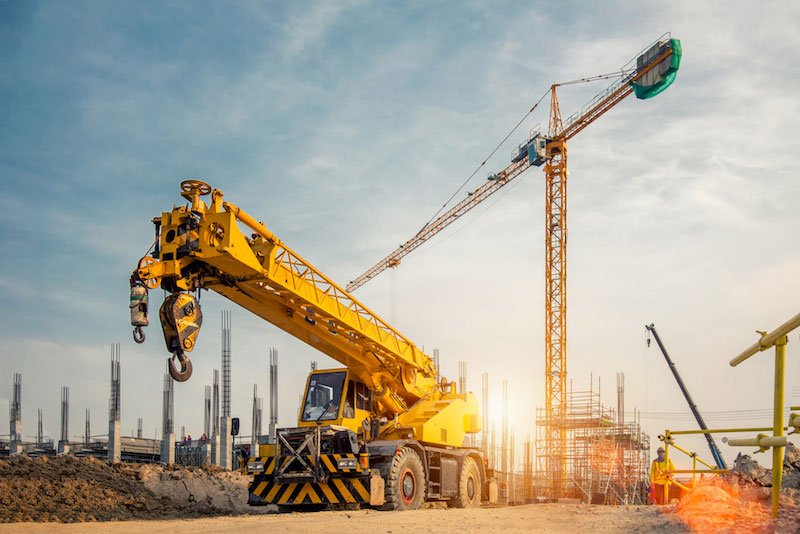Forklift Rental Providers for Industrial and Commercial Use
Wiki Article
Leasing Vs. Acquiring Construction Tools: Making the Right Selection for Your Task
When beginning on a building task, one of the essential decisions that project supervisors and stakeholders deal with is whether to acquire or rent out building and construction tools. The choice pivots on numerous factors such as price considerations, task duration, devices upkeep, versatility, risk, and scalability administration.Price Considerations
When reviewing the monetary element of getting versus renting out building and construction equipment, the long-term costs and ahead of time costs must be very carefully taken into consideration. Leasing equipment frequently calls for lower initial payments contrasted to buying, making it an eye-catching alternative for temporary projects or specialists with budget plan restraints. Leasing removes the need for huge funding investments and lowers the financial risk related to equipment ownership, such as upkeep and depreciation prices. However, in the lengthy run, continually leasing tools can collect higher prices than purchasing, especially for prolonged jobs.On the various other hand, buying building and construction tools involves greater ahead of time prices but can cause long-term financial savings, particularly for frequent individuals or lasting jobs. Possessing devices gives versatility, ease, and the capacity for resale worth once the project is finished. In addition, owning equipment enables modification and experience with certain machinery, possibly raising effectiveness and efficiency on-site. Inevitably, the decision between purchasing and renting building and construction equipment depends upon the job's duration, frequency of use, budget factors to consider, and long-lasting monetary goals.
Task Period

On the other hand, for long-lasting projects or ongoing building and construction work, acquiring tools might be the much more economical option. Getting devices can bring about set you back financial savings in the future, especially if the equipment will be often utilized. Furthermore, having equipment supplies a feeling of control over its availability and permits customization to fit specific project demands.

Equipment Upkeep
Provided the crucial function task period plays in determining the most cost-effective technique between acquiring and leasing building equipment, the focus now shifts in the direction of examining the important element of devices upkeep. Proper upkeep is essential for ensuring the ideal performance and durability of construction tools. Leasing equipment frequently comes with the benefit of having well-kept equipment provided by the rental company. This can reduce the burden of upkeep jobs from the task owner or contractor, conserving time and effort. On the various other hand, possessing tools requires a positive technique to upkeep to avoid failures, ensure safety, and expand the devices's lifespan. Routine inspections, servicing, and timely repairs are necessary to keep owned and operated tools in top working condition. Aspect in upkeep costs when choosing in between renting out and purchasing, as overlooking upkeep can cause pricey repairs, downtime, and job hold-ups. Inevitably, a well-maintained building and construction devices fleet, whether rented or owned, is necessary for the reliable and effective conclusion of building projects.Adaptability and Scalability
In the world of building tools administration, the facet of versatility and scalability holds considerable value for task performance and source usage. Opting to rent construction equipment provides a high degree of flexibility as it permits the fast modification of tools types and quantities based upon the progressing needs of a project. Renting makes it possible for service providers to access a large range of specialized equipment that might be required for specific tasks without the long-lasting dedication of ownership. This flexibility is particularly advantageous for tasks with varying requirements or unpredictable durations (scissor lift rental).Moreover, visit our website scalability, one more important factor, is inherently linked to flexibility. Leasing Going Here construction equipment provides the benefit of conveniently scaling operations up or down as task needs change. Specialists can quickly exchange or include tools to match the project's altering requirements without the restraints of owning possessions that may end up being underutilized or out-of-date. This ability to range sources effectively can cause price savings and boosted project timelines, making renting a positive option for tasks requiring adaptability and receptive resource allowance.
Danger Monitoring
Reliable threat administration in construction devices operations is extremely important to guaranteeing task success and mitigating prospective economic losses. Building and construction projects naturally involve different dangers, such as tools failures, accidents, and job delays, which can significantly impact the job timeline and budget. By very carefully taking into consideration the risks connected with owning or renting building equipment, job managers can make enlightened choices to reduce these prospective risks.Renting out building and construction equipment can offer a degree of danger reduction by moving the duty of repair and maintenance to the rental company. This can minimize the financial worry on the job owner in case of unanticipated equipment failings (rental company near me). Furthermore, leasing provides the versatility to accessibility specific tools for particular job stages, reducing the threat of owning underutilized machinery
On the other hand, having building tools gives a sense of control over its usage and maintenance. Nevertheless, this likewise indicates bearing the full duty for repair work, upkeep prices, and depreciation, boosting the monetary dangers associated with equipment possession. Cautious risk evaluation and factor to consider of aspects such as job period, equipment application, and maintenance needs are find more crucial in establishing one of the most appropriate option for efficient threat management in building and construction tasks.
Conclusion
In final thought, when determining between buying and leasing building and construction tools, it is necessary to consider price, job duration, devices upkeep, threat, scalability, and adaptability management. Each variable plays a crucial role in establishing the most suitable choice for the job at hand. By very carefully evaluating these aspects, project supervisors can make an informed decision that straightens with their budget, timeline, and overall job goals.
Report this wiki page